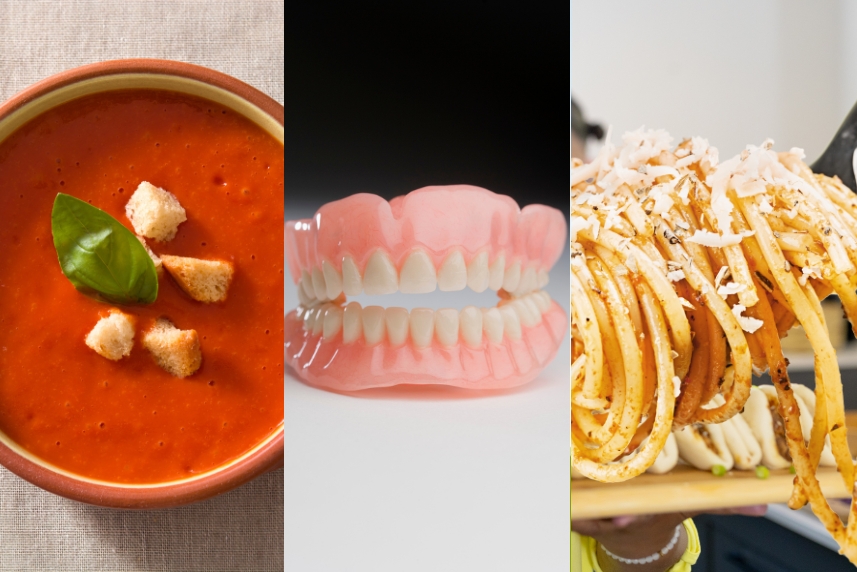3022 E 57th Ave #10 Spokane, WA 99223

Eating with new dentures can feel like a big adjustment, but with the right techniques, you can comfortably return to enjoying your favorite foods. Here, we’ll cover tips and tricks for easing into mealtime with dentures, ensuring you feel confident and comfortable as you adapt. If you’re looking for guidance on dentures in Spokane, this article provides insights to make your transition as smooth as possible.
1. Start with Soft Foods First
- When adjusting to dental plates, it’s best to begin with soft, easy-to-chew foods like yogurt, mashed potatoes, eggs, and oatmeal.
- Avoid crunchy or sticky foods in the early days, as these can put extra pressure on new dentures.
- Gradually introduce firmer foods to build comfort and confidence with chewing.
2. Take Small Bites and Chew Slowly
- Smaller bites reduce pressure on your artificial teeth and make chewing easier.
- Chew evenly on both sides of your mouth to maintain balance and prevent your dentures from shifting.
- Avoid using just one side, which can loosen your dentures over time.
3. Stay Hydrated to Aid Swallowing
- Dentures may reduce saliva flow, which can make swallowing difficult. Drink water throughout meals to keep your mouth moist and prosthetic teeth safe.
- Keeping your mouth hydrated helps with food breakdown and prevents discomfort or dryness that can affect your dentures.
4. Avoid Sticky and Hard-to-Chew Foods
- Acidic, spicy, or too-hard foods, like candy or nuts, can cause dentures to dislodge or break.
- These foods can also get stuck in or beneath false teeth, causing discomfort.
- If you’re craving something sweet, opt for softer treats that are easier to manage with dentures.
5. Practice Biting with Your Dentures
- Biting with dentures requires techniques different from those used with natural teeth. Avoid biting directly into tough foods like sandwiches or whole fruits.
- Cut food into smaller, manageable pieces, and use your side teeth to bite down to prevent movement.
6. Adjusting to Hot and Cold Temperatures
- Dental prosthetics may initially alter your perception of temperature in foods and drinks.
- Test the temperature of foods cautiously to avoid burns, as dentures insulate your mouth differently than natural teeth.
7. Using Denture Adhesives for Extra Security
- Denture adhesives can offer added stability, especially when eating challenging foods.
- Consult your dentist about safe adhesive products and application methods to prevent shifting while you chew.
- However, avoid over-reliance on adhesives; dentures should fit comfortably.
8. Routine Cleaning for Freshness and Comfort
- Clean your dental prosthetics after meals to prevent food buildup and odor. This not only improves hygiene but also ensures a better fit and comfort.
- A regular denture-cleaning routine will help maintain the longevity of your dentures and keep them looking fresh.
9. Monitor for Soreness or Discomfort
- It’s common to experience minor soreness with new prosthetic teeth, but persistent discomfort may indicate an adjustment is needed.
- Schedule regular visits with your dentist in Spokane to address fit issues and ensure optimal comfort as you get accustomed to eating with dental plates.
10. Gradually Return to Your Favorite Foods
- As you gain confidence and control, reintroduce some of your favorite foods in small portions.
- By gradually building up your comfort level, you’ll find that eating with dentures becomes a natural part of your routine.
Adjusting to eating with dentures takes time, but with practice and patience, you’ll regain confidence in your mealtime routine. Starting with soft foods, practicing balanced chewing, and maintaining denture hygiene can make the transition much smoother. For anyone in Spokane looking for dental plates, a local dentist can provide personalized tips and adjustments to make the journey easier. If you have any concerns, don’t hesitate to contact a dental professional for advice.
Welcome to Our Practice
Schedule Your
Visit Now!
Map
